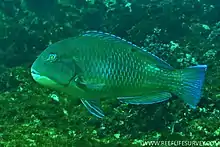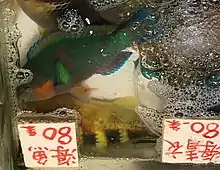Blackspot tuskfish
The blackspot tuskfish (Choerodon schoenleinii) is a wrasse native to the Indian Ocean and the western Pacific Ocean from Mauritius to Indonesia and Australia north to the Ryukyus. This species occurs on reefs, preferring areas with sandy substrates or areas of weed growth. It can be found at depths from 10 to 60 m (33 to 197 ft), though rarely deeper than 20 m (66 ft). It can reach 100 cm (39 in) in TL, and the greatest published weight for this species is 15.5 kg (34 lb). It is important to local commercial fisheries and is also farmed. It is popular as a game fish and can be found in the aquarium trade.[2]
| Blackspot tuskfish | |
|---|---|
 | |
| Scientific classification | |
| Kingdom: | Animalia |
| Phylum: | Chordata |
| Class: | Actinopterygii |
| Order: | Labriformes |
| Family: | Labridae |
| Genus: | Choerodon |
| Species: | C. schoenleinii |
| Binomial name | |
| Choerodon schoenleinii (Valenciennes, 1839) | |
| Synonyms[2] | |
| |
In Hong Kong, its Cantonese name, tsing yi (Cantonese:青衣), has been given to an island (see Tsing Yi).

Documentation of tool use
In July 2011, a professional diver photographed a blackspot tuskfish bashing a clam on a rock to break the shell, apparently a use of the rock as a tool, the first documented example of tool use in wild fish.[3]
References
- Fairclough, D. & Nakazono, A. (Grouper & Wrasse Specialist Group) (2004). "Choerodon schoenleinii". IUCN Red List of Threatened Species. 2004: e.T44669A10933431. doi:10.2305/IUCN.UK.2004.RLTS.T44669A10933431.en.
- Froese, Rainer and Pauly, Daniel, eds. (2013). "Choerodon schoenleinii" in FishBase. August 2013 version.
- Brown, Mark (July 11, 2011). "Diver captures first image of fish using tools". Wired Magazine. Condé Nast Publications. Retrieved 12 July 2011.
Tool use in fish, however, is much more rare, and there's never been any photo or video evidence to prove it -- until now.

